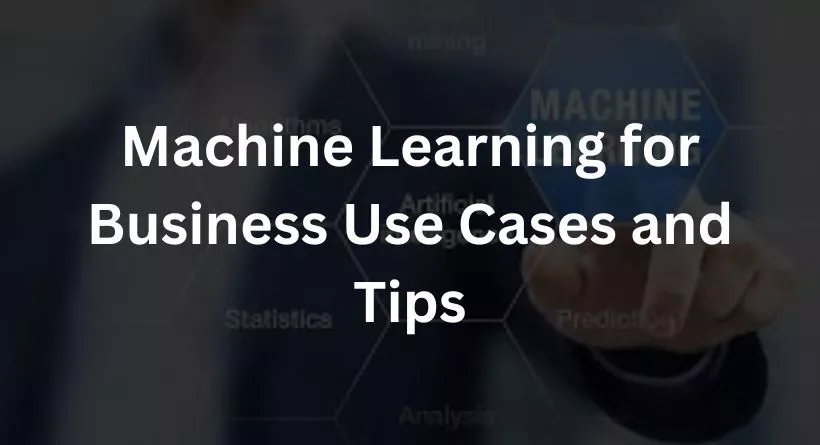
In today’s fast-paced business landscape, terms like Artificial Intelligence (AI) and Deep Learning are frequently used, but what do they really mean, and how can they benefit your business? The same applies to Machine Learning (ML), a technology that is gaining increasing attention in the business world. In this article, we will delve into the world of Machine Learning, explaining what it is and exploring various ways it can be harnessed to optimize your business processes.
What is Machine Learning, really?

Machine Learning (ML) has made significant strides in recent years, revolutionizing industries across the board. From detecting credit card fraud to delivering targeted social media advertisements, ML automates tasks that were once handled by humans. ML represents the domain of AI where algorithms are used to perform tasks without explicit programming. Instead, these algorithms recognize patterns in data and make predictions based on their learning when new data becomes available. It’s a powerful tool for automating complex tasks that extend beyond rule-based automation. Traditionally, developing ML solutions was a costly and time-consuming endeavor, but with the advent of no-code ML tools like Levity, this technology is now accessible to businesses of all sizes.
You may also like reading: How to Leverage Machine Learning and AI for Small Business
Three Forms of Machine Learning
To understand how ML can be used in business and how it functions, it’s essential to grasp the different methods through which ML can operate. The three most common forms of ML are supervised learning, unsupervised learning, and reinforcement learning.
Supervised Learning
Supervised learning employs labeled data to train ML models. These algorithms can be trained to categorize data correctly or predict outcomes. For example, supervised learning can help businesses tackle real-world challenges on a large scale, such as filtering spam emails.
Unsupervised Learning
Unsupervised learning deals with unlabeled data, allowing algorithms to uncover hidden patterns and data groupings automatically. This form of learning excels in handling more complex problems, making it ideal for exploratory data analysis and pattern discovery.
Reinforcement Learning
Reinforcement learning places computer models in a game-like environment where they learn through trial and error, guided by feedback in the form of rewards and punishments. This approach enables models to optimize their behavior over time.
By combining supervised and unsupervised learning techniques, businesses can classify consumers based on both existing data and data yet to be discovered, enhancing their understanding of their target audience.
Applications of Machine Learning in Business
Machine Learning offers a wide array of applications to streamline processes and workflows across various business domains. Here are some of its top applications:
Sorting and Routing Incoming Emails
Automate the sorting of incoming emails into actionable datasets using AI-powered tools. You can choose to respond manually, automate responses, or receive alerts for urgent requests based on email tags. Additionally, this approach allows for in-depth data analysis, providing insights into campaign performance.
Content Moderation and Generation
Content moderation can be a time-consuming and error-prone task, making automation crucial. ML-based content moderation tools, like Levity, can swiftly process large volumes of text and images, freeing up your team to focus on more critical tasks.
Tagging Email Attachments
Categorize email attachments by type, such as PDFs, images, or spreadsheets, and route them to the appropriate teams or departments. This ensures that documents reach the right destination on the first attempt, improving efficiency.
Classify Customer Support Tickets
ML-powered document classification can categorize customer support tickets by topic, department, urgency, or language. This streamlined approach expedites issue resolution by directing tickets to the right teams or departments, enhancing customer support efficiency.
Product Quality Inspection
ML can be a game-changer for quality inspection, identifying defects in products early in the production process. This is especially valuable in industries such as real estate, manufacturing, and retail, where visual inspection is critical. ML technologies, particularly Computer Vision, excel at detecting variations from expected quality, triggering alerts when deviations occur.
Machine Learning for Business – Common Myths
Before diving into Machine Learning, it’s important to dispel some common myths:
Myth 1: AI and ML Will Replace Humans
Contrary to this belief, Machine Learning is designed to assist, not replace humans. It frees us to concentrate on higher-level tasks like strategy and creativity.
Myth 2: AI and ML Are the Same
While AI and ML are closely related, they are not identical. Machine Learning is a subset of AI, and understanding the distinction is crucial for making informed decisions about technology implementation.
Tips for Applying AI and Machine Learning in Business

Here are some best practices to follow when integrating Machine Learning into your business operations:
Ensure Data Quality
The quality and quantity of data directly affect the accuracy of ML model predictions. Your model can only learn from the data you provide, so it’s essential to ensure your data accurately represents your business needs.
Be Prepared for Continuous Adjustments
Setting up an ML workflow requires careful planning and testing. Unique and complex use cases may necessitate custom Machine Learning solutions to ensure success. Adequate resources are essential for the meaningful outcomes of ML projects.
Conclusion
In conclusion, Machine Learning is a powerful tool with numerous applications in the business world. It can automate tasks, improve efficiency, and enhance decision-making. However, to make the most of Machine Learning, it’s essential to understand its principles, dispel common myths, and follow best practices for implementation. By harnessing the potential of Machine Learning, businesses can stay competitive and thrive in today’s dynamic environment.
FAQs
Can Machine Learning completely replace human decision-making in business?
Machine Learning is designed to assist humans, not replace them. It can automate tasks and provide valuable insights, but human judgment and creativity remain essential in many business processes.
What is the difference between Artificial Intelligence (AI) and Machine Learning (ML)?
AI is a broader concept that encompasses various technologies, including ML. ML is a subset of AI specifically focused on training algorithms to learn from data and make predictions.
How can businesses ensure the data used for Machine Learning is of high quality?
Data quality is crucial for accurate ML predictions. Businesses should establish data quality standards, clean and preprocess data, and regularly monitor data sources.
What are some industries that can benefit the most from Machine Learning?
Industries such as e-commerce, healthcare, finance, and manufacturing have seen significant benefits from implementing Machine Learning in their operations.
Are there any no-code Machine Learning tools available for small businesses?
Yes, there are no-code ML tools like Levity that make Machine Learning accessible and affordable for businesses of all sizes, including small enterprises.






